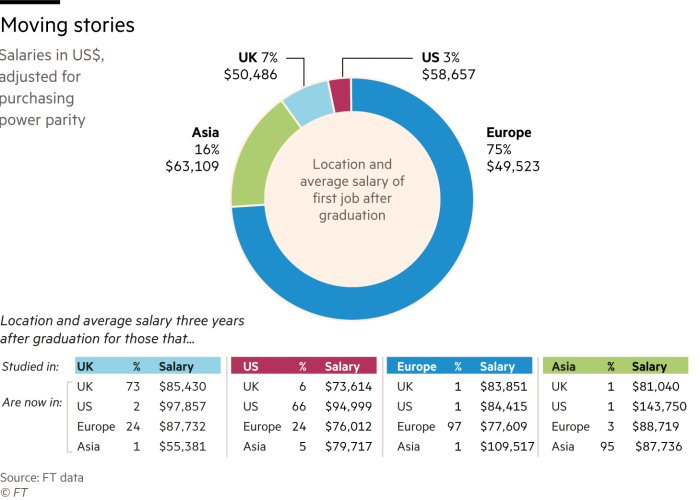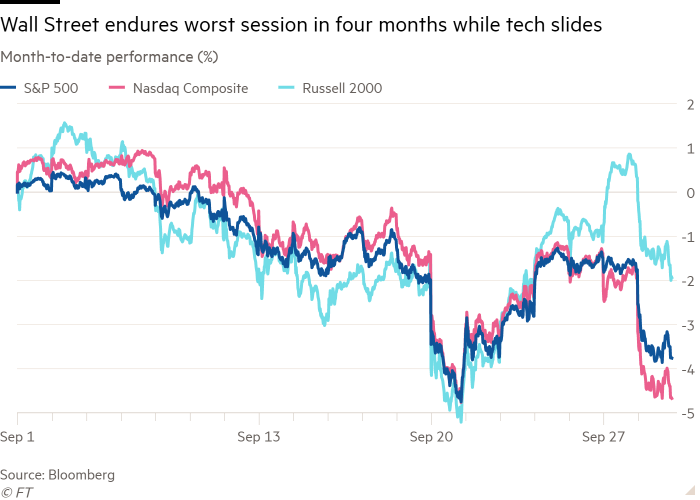Hope you had a good weekend. If you are doing good for society, there’s a chance to gain recognition and win an award for your work. Also, how would you react if the government puts soldiers on the streets to help with a civil crisis. Their skills can offer lessons for managers. Written and edited by Wai Kwen Chan and Andrew Jack.
Noticeboard
Claim your free FTNextGen student passes
FT NextGen, on October 28, brings together the best and brightest of the next generation for a jam-packed day of riveting panels, keynotes and audience participation. Sign up for your free digital student pass today.
Be in with a chance to win one of our responsible business education awards
The FT invites business school teachers, researchers and alumni around the world to enter its new awards for responsible business education. Entries are open until October 20 for examples of projects by recent graduates, teaching cases, and research studies that have had a positive societal and environmental impact.

Andrew Hill’s Management Challenge
The UK government’s request to the army to help plug an avoidable shortfall in petrol-tanker drivers is a reminder that the military possesses plenty of qualities that companies — and governments — ought to build. As I’ve written this week, desirable traits include preparedness, resourcefulness, flexibility and decisiveness.
Many companies like to hire ex-military personnel precisely because they receive rigorous training in these areas. For my management challenge this week, pick another quality instilled by the army, navy or air force from which you think businesses could learn and send your brief reasons for choosing it to bschool@ft.com. (I’m open to the counterview, too, if you prefer to select a military trait that civilian managers should avoid.)
Last week, I asked for memos to the boss justifying a first post-lockdown visit to an in-person conference. Thanks to Matthew Beard for this: “As Woody Allen famously said, 90 per cent of success is showing up — and he surely didn’t mean the discounted virtual programme that our main competitor has just opted for.”
In further reading, a creepy analysis by Danielle Abril and Drew Harwell in the Washington Post of tech-enabled surveillance of remote workers. “It’s just this constant, unnecessary, nerve-racking stress: You’re trying to concentrate and in the back of your mind you know you’re on camera the entire time,” says one who quit because of intrusive monitoring of her work.
Data line
Where do Masters in Management alumni go after finishing their studies? Three years after completion, most MiM alumni have stayed in the same location as their first postgraduate job and earn 55 per cent more on average, adjusted for purchasing power parity around the world, say Sam Stephens and Leo Cremonezi. Here are more charts about the MiM programme.

Work and careers round-up
A focus on career and networking has been what differentiates LinkedIn from rival social media platforms such as Facebook and Instagram. However, over the past 18 months, users have increasingly veered into personal musings, according to Dan Roth, editor in chief of LinkedIn.
Users are considering “what they want to do, are they working on the right things, how are they dealing with the pressures of work and life?”
Do you have advice for one of our readers who is concerned that her professional skills are too niche?
“How do I pivot? Is the only option an MBA?”
Money isn’t everything in the Great Re-evaluation. People are rethinking what they really want from working life and employers need to watch them closely, says Pilita Clark
“Worryingly for employers, nearly two-thirds of those thinking of leaving say they are ready to go with no new job in hand.”
Creating a culture that can attract and retain staff of all ages is vital during a time of mass resignations. Sarah Drinkwater, a former Google executive and an angel investor, explains how to adapt your leadership to a multigenerational workplace.
Find out how former convicts of white-collar crime rebuilt their lives after serving time. Also, why do businesses keep trying to find a ‘magic’ playbook? Here are top four things any company scaling at speed needs to get right, says June Angelides, an investor in technology start-ups.
Find out how jazz provides lessons in management. Olli-Pekka Heinonen, director-general of the International Baccalaureate system, believes that leadership centres on implementation, not strategy.
How good is your knowledge of the news?
Top reads
US stocks suffer biggest loss since May as inflation fears spread S&P 500 drops 2% while yield on 10-year US Treasury touches highest level in three months.

Scholz and Social Democrats win tight German election The country heads for long talks over a three-way coalition as Laschet insists CDU can also form a government.

Britain’s winter blues: ‘Christmas shortages are now a certainty’ From petrol, gas and food supplies to hospitals under pressure, the UK could face a series of overlapping crises.

Back issues
To view previous newsletters, go to: ft.com/bschool.
If this newsletter was forwarded to you, then please sign up for the FT Business School Briefing.
Thank you for reading. Please send your recommendations and feedback to bschool@ft.com.
Recommended newsletters for you
Unhedged — Robert Armstrong dissects the most important market trends and discusses how Wall Street’s best minds respond to them. Sign up here.
FT Schools Digest — Perfect for teachers and students. Sign up here.
Business School Briefing: Military qualities, LinkedIn gets personal, mass resignations
Pinoy Variant


